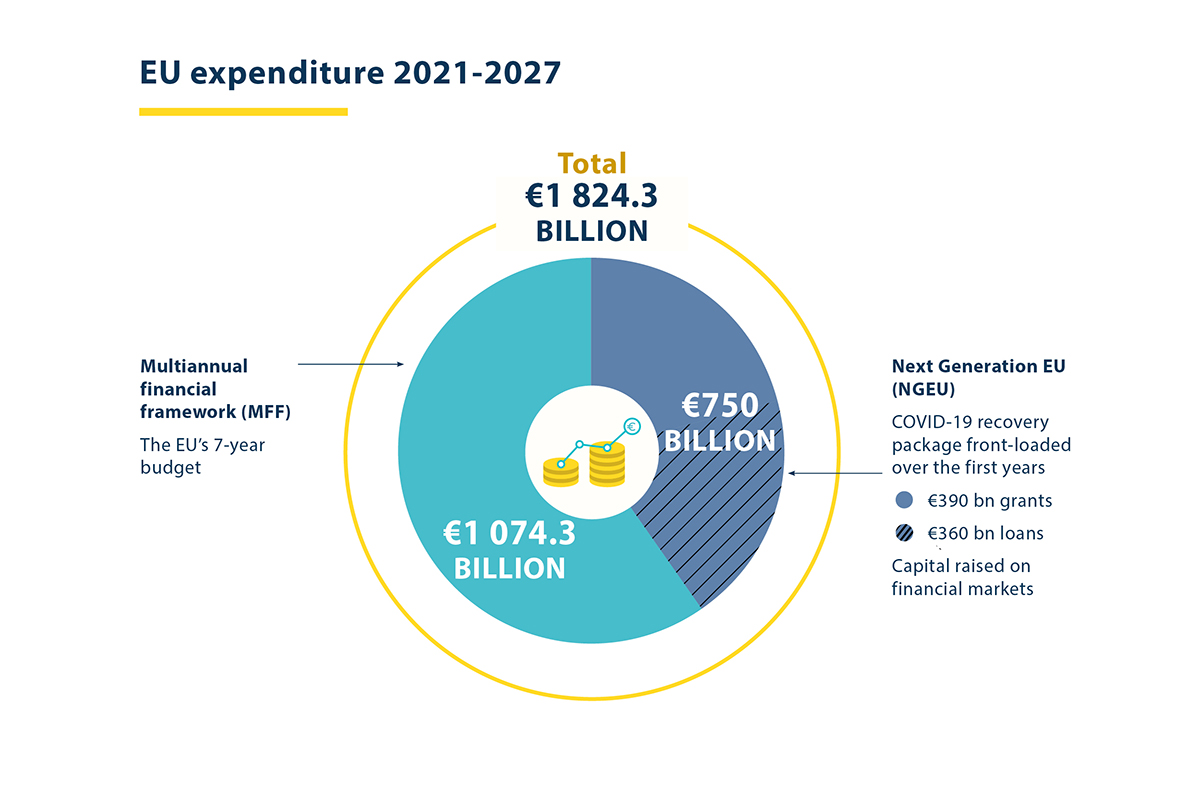New EU long-term budget – what does it mean for you?

date: 11/09/2020
July's negotiations on the 2021-27 EU budget were a real marathon - it took European leaders four days and nights to agree. The result is like no other before.
This time, EU budget consists of two parts. The first is the regular budget of €1.074 trillion for the next 7 years. The second is the special €750 billion coronavirus recovery fund (called Next Generation EU). The recovery fund will be spent in the next 3 years to boost the EU's economy.
The budget is divided into seven topics (called headings in EU jargon) covering all kinds of actions the EU takes within its remit. For details, see the infographic.
Weighty resources to fight youth unemployment
The largest part of the budget will be spent to support national governments' actions to create new jobs, help businesses hit by the COVID-19 crisis to recover, and reduce economic and social inequalities. European leaders have allocated over €370 billion for these goals under the heading called ‘cohesion, resilience and values’.
On top of that, most of the money from the Next Generation EU fund will be spent on boosting the European economy. This is especially important for young people, as the group the most exposed to the COVID‑19 crisis. Since January, almost 200 000 young people have lost their jobs across the EU. According to Eurostat, the youth unemployment rate rose to 17% in July from 14.9% in January.
Almost €88 billion will be spent specifically on youth employment, up- and re-skilling of workers, social inclusion and fighting poverty.
Greener than ever before
European leaders have kept their commitment to fighting climate change. They agreed that, as a general principle, all EU expenditure should be consistent with the Paris Agreement objectives. At least 30% of all resources have to be spent on actions supporting climate objectives.
For agriculture - one of the largest slices of the EU's budget cake - the threshold is even higher. 40% of expenditure on the common agricultural policy (CAP) is expected to be dedicated to climate action. This means more money for innovation in agriculture or for farmers who use more eco-friendly methods.
While critics say that this is not enough, in the current crisis circumstances it was the most that countries could devote to this.
Reaching climate neutrality by 2050 is challenging for some countries and regions (such as those dependent on coal mining). To help people and economies in these areas to adapt, a special fund known as the Just Transition Fund was created.
A plus for Erasmus+
The most widely known and successful of EU programmes that allows people to work and study abroad, Erasmus+, has seen a solid budget increase. Between 2021 and 2027, there will be €21 208 million to spend for young students and professionals - 40% more than in the previous long-term EU budget.
The programme is also aimed at strengthening transnational cooperation opportunities for universities, vocational education and training institutions.
European science flying high
The new EU budget and recovery instrument are good news for young scientists and innovators. Over €80 billion have been earmarked to boost EU-wide research programmes and support innovation through a programme called Horizon Europe.
The EU continues to support large-scale scientific projects such as the European Space Programme and the International Thermonuclear Experimental Reactor. For example, in the next 7 years, there will be €8 000 million to spend on Galileo, the European satellite navigation system.
In addition to research financed through the Horizon programme, to further support the digital transformation of the EU, the EU will invest over €8.5 billion in high-performance computing, artificial intelligence and cybersecurity. These resources will be available through programmes called Digital Europe and the Connecting Europe Facility.
What's next?
Now the Council must secure consent of the European Parliament. Once co-legislators have agreed, the Commission will start implementing it to launch financing as quickly as possible.
If you want to hear real-life examples of Europeans benefiting from the budget, check out this interactive story.
